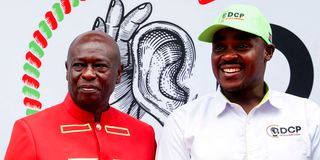Premium
Kenya’s perilous cycle of short-lived parties

Former Deputy President Rigathi Gachagua and interim Deputy Party leader Cleophas Malala pose for a photograph after unveiling their new political outfit, the Democracy for the Citizens Party (DCP) in Lavington, Nairobi on May 15, 2025.
As the 2027 General Election looms, Kenya’s political landscape is once again morphing into a marketplace of shifting loyalties and manufactured movements. The latest entrant is former Deputy President Rigathi Gachagua’s Democracy for Citizens Party (DCP), a formation born not of conviction but convenience, emerging from the ashes of a fractured alliance with President William Ruto.
While Article 91 of the Constitution enshrines the right to form political parties, one is left to ponder: when does plurality become parody? This familiar dance of defections, ethnic arithmetic, and rebrandings underscores a deeper malaise in Kenya’s democratic soul - a culture where politics is performance, not principle.
The Bible in Psalms 1:4 speaks of the wicked as “chaff that the wind blows away” - transient, rootless, and devoid of substance. This metaphor hauntingly mirrors Kenya’s political scene, where parties sprout like weeds during the rainy season only to wither after elections. In the aftermath of the Moi era, the 2002 Narc coalition seemed like a phoenix rising from the ashes of autocracy, briefly rallying the nation around the slogan ‘Yote Yawezekana.’
Yet, like Solomon’s divided kingdom, Narc soon splintered, giving birth to ODM-K, ODM, PNU, and ultimately the 2007 post-election violence. That national trauma forced an uneasy Grand Coalition, a reminder that “a house divided against itself cannot stand.”
Since then, the story has repeated with numbing regularity
In contrast, mature democracies provide ideological anchor points. The US debates progressivism versus conservatism through Democrats and Republicans. Germany navigates centrism and social democracy via the CDU and SPD. India’s BJP and Congress frame contestations around secularism and nationalism. Kenya, meanwhile, turns every election into a tribal swap meet, with coalitions like Azimio la Umoja and Kenya Kwanza bartering regional kingpins like chess pieces.
The Constitution, progressive in spirit, fails to provide safeguards against this descent into form-over-substance politics. While it demands that parties promote unity and respect diversity, the Registrar of Political Parties remains a passive observer to the institutionalisation of ethnic mobilisation.
If we are to halt this descent, bold reform is necessary. A constitutional amendment mandating nationwide membership thresholds - similar to Germany’s five per cent parliamentary rule - could thin the herd and prioritise coherence. Laws like South Africa’s Anti-Defection Act could curb the rampant floor-crossing that turns Parliament into a theatre of betrayal. Political parties should be required to submit ideologically consistent manifestos, audited periodically for compliance with national values.
Kenya now stands at a moral and political crossroads, echoing Joshua’s ancient challenge: “Choose this day whom you will serve.” Will we continue to indulge the chaff of personality cults and ethnic fiefdoms, or demand the wheat of policy-based leadership and institution-building?
This moment calls for more than cosmetic changes; it demands a new covenant - one that elevates parties from startups into national instruments of development.
Patrick Henry Ogweno, General Overseer, Remnant of Christ Gospel Ministries and a Communications & Philosophy Expert based in Nairobi.

